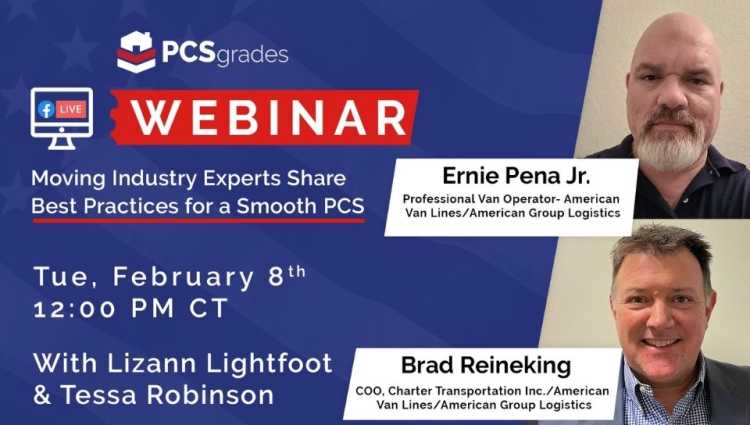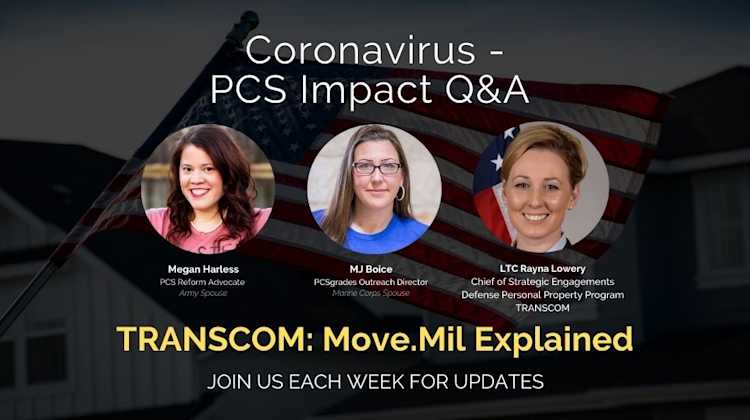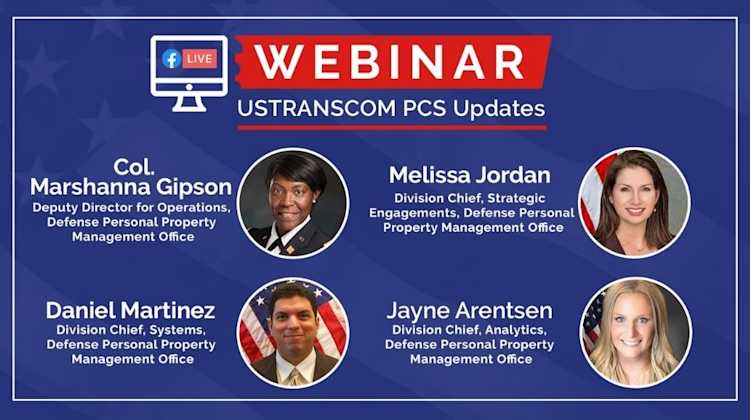Ask a Driver: PCS Tips from Charter Transportation
by Lizann Lightfoot - February 21st, 2022

Ernie Pena: I’m a professional van operator with American Van Lines. I’ve been working in the moving industry since 1985 when my dad put me in the business. I’ve been on both sides of the steering wheel, and I now do 100% military moves, so I understand what our military families go through, and I’m happy to get them where they need to go.
Brad Reineking: I’m the COO of Charter Transportation, and I’ve been in the industry for a little over 30 years. My dad was in the industry for 45 years. The first 20 years of my career, we focused on corporate national accounts. For the past 10 years, I have been with Charter Transportation focusing on military moves. We average a 52% rate of return on Customer Satisfaction Surveys, and we average a 96% approval rating.
Watch the full interview here:
How are things looking for peak PCS season this year?
Brad: Moving companies across the industry--not just military accounts--are still recovering from the COVID shutdown and the shortage of drivers during the pandemic. The corporate accounts are still climbing after the slow-down during the pandemic. So in the military world, the 4th quarter was still very busy, so we never really got a break. Things did not slow down, which is not a good indicator for this season.
The West Coast saw the biggest challenge with capacity because so many other people were moving out of California to other states. The issues we had with port congestion and supply chain issues does affect things on the side. You can’t go out and buy used equipment, and the costs of both supplies and packing materials has really gone up. Internationally, work Visas are becoming easier to get, so we are seeing a spike internationally, which impacts our capacity. The labor shortage affects the moving industry too, because it has always been difficult to attract people to our industry. We need to get more young people into the industry, and it is always challenging to get new movers.
I was on a phone call with the DoD and TRANSCOM, and it sounds like they are still planning to move the same numbers during peak season as they did last year. When we reach 65,000 moves in a week, we run out of capacity, so many families then are forced to move themselves. I think 2022 is going to be even more challenging than 2021. So if you can do anything to plan farther in advance, make reservations early, or move near the fringes of peak season instead of during the summer, then that will be a big help this year.
Ernie: Preparation is the key to all these challenges. If you can avoid moving at the end of the month--particularly May, June, or July--then that is best, Everyone tries to move at the end of the month to avoid their rent, so trucks are in shorter supply. So try to be flexible and move at the beginning of the month. We have a greater shortage of drivers and labor than I have seen before, and everyone is talking about it. I tell customers to pay attention to their dates, be flexible, and understand that no one is out to get you. Our goal is to provide you with good service.
What does a day in the life of a driver/ van operator look like?
Ernie: I’m on the road away from home 200-250 nights a year, on average. That's why I connect so well with military families. Most drivers wake up in the morning in their truck or a hotel room looking for breakfast, hoping that nothing breaks down and their crew all shows up. During the day, I am making calls to check on customers, and to do rescue missions. Truck drivers shower in truck stops, deal with traffic issues, etc. The way I prepare to get to a customer’s house in Washington, D.C. or in L.A. is different from Montgomery, Alabama, because I have to get across town. As soon as I get my order from Charter, I’m on the phone with the customer asking about their TVs, mattresses, box springs, and boxes. I have to discuss storage options, because some parts of the country have storage blackouts during the summer, so I may need to deliver to storage locations 600 miles away.
We still manage our own households. I’ve been married 29 years. My sons are older--27 and 22--but I have a 6-year-old grandson who likes to go fishing. So we manage the truck, the crew, the household, and all the issues that come up along the way.
Brad: The more information you have about the move, the better off you will be. During peak season, the trucks and crews are pushed to the limits. Drivers have to deal with DOT inspections and regulations, as well as hours of operation restrictions. Sometimes he gets stopped at the base gate, because there is no consistent way to get on different bases and each one has their own regulations. There are a lot of things happening outside of our control, so we have to communicate with our families often. Drivers should understand the vehicle they are driving and whether it will fit at the destination. Smaller shuttle trucks aren’t always available, so we can’t always rent the truck we need to get into a smaller space.
For anyone doing a PPM (Personally Procured Move) or DITY move, if you need your truck on a Tuesday, make the reservation for a Monday. Trucks are in short supply, so if they can’t find you one, that gives them a buffer day to get one to you on schedule.
Ernie: I usually set up my trucks and my labor several weeks in advance. If I set up a crew for one day, they may be with another driver the next day, so I can’t miss that day or I lose the whole crew. One of the biggest challenges I have is getting on base. I don’t have a record or a ticket, but sometimes I get on base several days in a row, then at the end of the week I am suddenly stopped and there’s a problem. Some bases get pickier than others. I had a guy stopped with an unpaid ticket, another for unpaid child support, and some who get on base all the time and then get denied the next day without reason.
Brad: TRANSCOM is aware of this issue, and is trying to streamline the process so that there are consistent standards at each base, and for each shift. Currently, the standards are set by each base commander, which is why things can be inconsistent.
What do you wish more military families knew about moving?
Brad: When your move is awarded to a specific TSP (Transportation Service Provider), they should call you within 24 hours to gain as much information as they can. It’s a 15-minute phone call, and it’s important for the service member to understand their requirements before moving day. We ask, do you need storage? What size items do you have? Will there be multiple deliveries (express shipment, storage items, etc.) We follow this up with an email letting the service member know the expectations: disconnect and drain the washing machine, take the TV off the wall, etc. Sometimes people ignore this and it makes things take longer.
We also ask the service member if they moved before and know what their previous weight was for their household shipment. This helps us plan to give you a trailer that is large enough, and it helps the service member know where they will fall in their weight allowance, so they can avoid getting charged after the fact. If you have moved before, try to keep track of any previous shipments, and note whether there were multiple shipments or if it is now all in one place. The service member should have access to their previous weight through their Transportation Office. If you have done a PPM or DITY move, then keep track of your previous weight tickets that were used for the reimbursement.
How should military families prepare for a move?
Ernie: I drive an 80-foot truck, so when I drive into the neighborhood, it’s in everyone’s way. It’s important to prepare neighbors and have cars already moved out of the driveway, so I don’t block people going to work and school. I often block the neighbor’s driveway, so check with them ahead of time to see if they need access to their car or garage. If it is trash day, let people know you will be putting trash cans in front of their house for the day.
Animals and pets should be kept out of the way. Some movers have had bad experiences with animals before, so even if your dog doesn’t bite, have a plan to keep them away on packing and loading days.
We can’t work with our shoes off. We provide floor coverings to protect your floor, but we can’t put booties on and off when we are going in and out of the house.
We aren’t allowed to unscrew anything that is attached to the wall. If a picture is hanging, we can lift it off the nail, but we can’t detach the washer, dryer, or TV. So it’s best to disassemble things in advance. But remember that if you took things apart, the moving crew didn’t see it come apart, so you may need to help put it back together.
If you want us to use a particular bathroom during the day, please let us know in advance to help reduce stress for everyone.
Can military families pre-pack or use plastic totes?
Ernie: Policy says that the moving company has to inspect any box, because as soon as we take possession, we are liable for the contents of a box. If it is something pre-packed with clothes or something, I will inspect it for density, because if there is an empty space at the top, then the box will get crushed, items will shift, and on hard roads that can really damage things. I don’t want to take everything out and haul an empty tote, but I need to inspect that it is packed properly. We are grateful when people try to get ahead of the game, but we have to inspect it according to policy.
You should pack a separate “first night” box with any essentials like toilet paper and cleaning supplies that you are going to hand-carry with you, and keep that separate from everything else so those essentials don’t get packed onto the truck.
Also, please don’t pile everything that needs to get packed into one room like a garage! People sometimes think it will be helpful to gather everything into one place, but if we can’t even get into the room and don’t have space to move around, then it makes it really difficult to pack anything in there.
What is the most stressful for drivers and movers?
Ernie: We are walking into your personal space--your home--and packing everything. We are there to work with you and work alongside you. I’m a stranger at the beginning, but before I drive off with all your belongings, I hope to be some sort of friend! We have some people who don’t want to move, so they have thrown things at my guys from upstairs! Other times, people don’t want to show you around and let you see some of the rooms because “they aren’t ready.” Sometimes customers get pushy and want to tell us how to pack or move things. I understand some people have had a bad move before, and that just adds to the stress. We are all human, and we want to bring our best experience. Getting aggressive or cussing out the moving coordinators or the dispatchers won’t help anyone. We are all looking for a solution, so let us work with you to help you.
Lizann: It’s not just the family and the movers, but it’s like a triangle between all of us and TRANSCOM. It works best when we all work together as a team. No one is trying to clog up the system, we all want a successful move as the outcome.
Brad: The question is, “how do you recover when something goes wrong?” We already know it is bad, we don’t need to have my phone blowing up with complaints. I want to make things right and take care of the customer.
Every year, we get complaints about something precious being lost or stolen. I encourage everyone to have their valuables insured. If it is jewelry, you should definitely try to hand-carry it with you. Try to put it in your suitcase, and don’t make it obvious that it is sitting there. There are bad apples in the moving industry too, and sometimes referred to as “rogue movers.”
We also get complaints a week after the move about damage done to the house or the driveway. When you notice something, report it right away--don’t wait! It is so much easier to resolve it when it is reported immediately, so we can follow up with drivers while it is fresh in their memory.
What is the Customer Satisfaction Survey?
Brad: The CSS (Customer Satisfaction Survey) is what TRANSCOM uses to award moves to different companies. So the amount of surveys you have received, paired with your satisfaction score, gives you a higher point value. Unfortunately, only about 15% of people who move are actually completing their surveys. So I would encourage everyone to do the CSS at the end of their move, whether it is good or bad. It really helps TRANSCOM award moves more efficiently. We see all the comments that go into Facebook groups and pages, and that won’t make a difference. The impact will really be felt when they complete the CSS. We start talking to the service member about it as soon as we contact them for the move. We need to get the grades for the moving companies and drivers so we all know what is going on out there.
If you had a good move in the past, you can request to have the same mover or company again. Contact your PPSO connection. Someone like Ernie can only touch about 70 moves per year. But we can help direct people to their preferred moving company to provide the same level of service, if that’s something they want. When I get a request from someone, I am going to put more effort into it because that was a direct request.
Email Ernie at ErniePena1971@gmail.com
Email Brad at BradR@chartertsp.com








